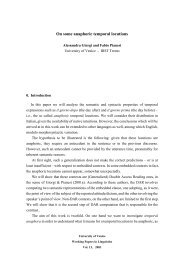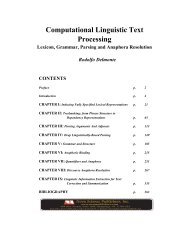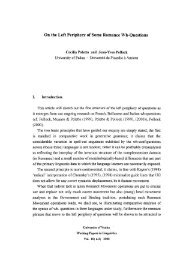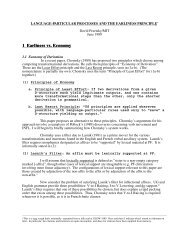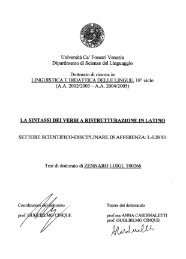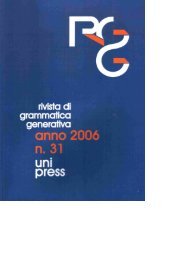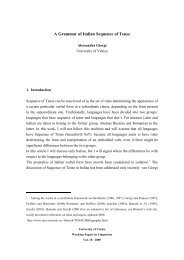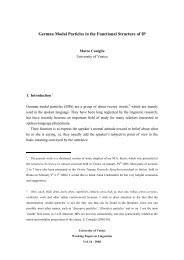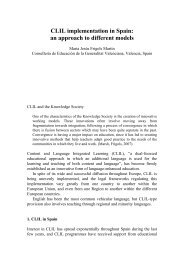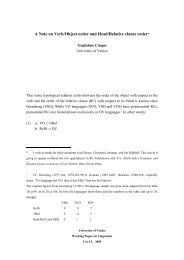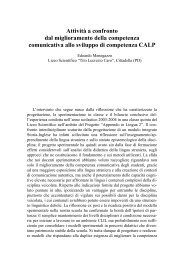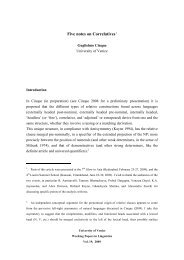1 GAPS, GHOSTS AND GAPLESS RELATIVES IN ... - ling.auf.net
1 GAPS, GHOSTS AND GAPLESS RELATIVES IN ... - ling.auf.net
1 GAPS, GHOSTS AND GAPLESS RELATIVES IN ... - ling.auf.net
Create successful ePaper yourself
Turn your PDF publications into a flip-book with our unique Google optimized e-Paper software.
(Steve Bruce, BBC Radio 5)<br />
b. …[because of which obviously we’ve lost the game]<br />
c. …*[which obviously we’ve lost the game because of]<br />
(23) a. There’s always the Landon Donovan approach, [which Landon Donovan said: “You<br />
know what, I make plenty of money, I’m happier playing for Major League<br />
Soccer”] (Gary Richardson, BBC Radio 5 = 4f)<br />
b. …[in which Landon Donovan said “You know what, …”]<br />
c. …*[which Landon Donovan said in “You know what, …”]<br />
(24) a. It’s an environment [that people are trying to get better] (Gabby Logan, BBC Radio<br />
5)<br />
b. …[in which people are trying to get better]<br />
c. …*[which people are trying to get better in]<br />
(25) a. Players need to play on a level [which you know what you’re going to get out of<br />
them] (Ray Parlour, Talk Sport Radio)<br />
b. …[at which you know what you are going to get out of them]<br />
c. …*[which you know what you’re going to get of them at]<br />
The fact that the (a) examples only allow a paraphrase with a pied-piped preposition (and<br />
not one with a stranded preposition) calls into question Caponigro and Pearl’s central<br />
assumption that prepositions with wh-objects can only be silent when stranded.<br />
Having examined (and argued against) the possibility that gapless relatives involve<br />
relativisation of the object of a silent stranded preposition, we now turn to develop a novel<br />
deletion analysis in the next section.<br />
4. Ghosting<br />
An alternative to a silent preposition analysis of missing prepositions in gapless relatives is<br />
to suppose that prepositions go missing via a deletion operation of some kind. One way in<br />
which prepositions can be deleted is via Ellipsis. In this connection, consider how the<br />
angle-bracketed preposition comes to be ‘silent’ in the following:<br />
(26) a. The fact that it was against the opposition [that it was ], does that make it<br />
even more special? (Interviewer, Sky Sports TV)<br />
b. That’s why I’m in the position [I am ] (Mark Webber, BBC Radio 5)<br />
c. The teams are in the colours [you’d expect them to be ] (Nigel Adderley, BBC<br />
Radio 5)<br />
The reason why the preposition inside the bracketed relative clause is unpronounced is that<br />
it undergoes the same form of Ellipsis (involving Antecedent-Contained Deletion) as that<br />
which results in the angle-bracketed verb phrase being elided in sentences such as the<br />
following:<br />
(27) The fact that you were playing against the opposition [that you were ], does that make it feel even more special?<br />
This raises the question of whether all ‘silent’ prepositions in gapless relatives can be taken<br />
to be the result of Ellipsis.<br />
The answer is ‘No’, for the following reason. Cases of Ellipsis involve a constituent<br />
being given a null spellout when it has an antecedent. However, only 19/243 (8%) of the<br />
gapless relatives in our recordings were structures like (23) where the ‘missing’ preposition<br />
in the relative clause had an antecedent in the matrix clause; the overwhelming majority of<br />
10



